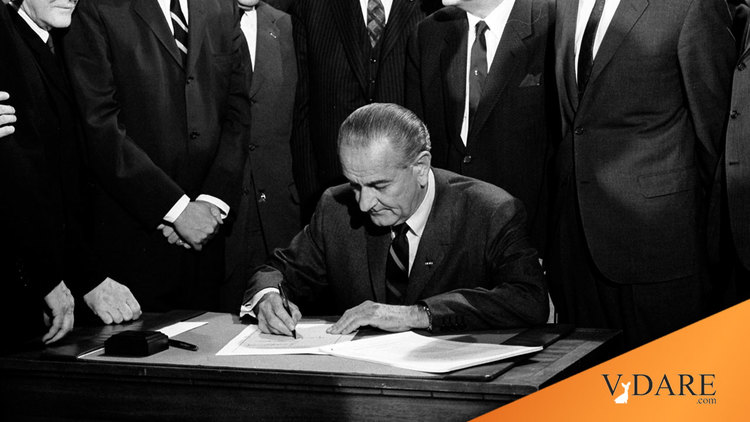
04/03/2010
By an amazing coincidence, two friends of VDARE.com, Paul Gottfried and Ilana Mercer, have quite separately just dared to criticize the now-sacrosanct 1965 Civil Rights Act, Paul in the context of his continuing scholarly study of the degeneration of the Establishment Right of which National Review and its post-purge Editor Rich Lowry are symptoms, (Obamacare Is a Civil Right, AltRight, April 2 2010), Ilana in a restatement of the very real but now repressed classical liberal objections to the legislation (Liberty and the Civil Wrongs Act, WND, April 2 2010).
This reminds me that, because of the usual chaos, I never got around to noting the comment I was kindly asked to make, along with Paul Gottfried and others, about William Voegeli’s Summer 2008 Claremont Review of Books essay Civil Rights and the Conservative Movement, which was basically a discussion of the just-deceased William F. Buckley’s typically confused record on the issue. The comment is here, but they make you scroll down a long way so I've pulled it out:
I am afraid that William Voegeli’s subtle and almost serpentine essay is somewhat weakened by its use of William F. Buckley as a symbol and a symptom. Buckley-I realize with shock that I knew him for 30 years-was not a systematic thinker and, at least in his latter years, was wholly motivated, so far as I could tell, by status and insecurity. Thus for example his 2001 agreement with Michael Kinsley that the 1964 Civil Rights Act, was, on second thoughts, a good thing, sort of, doesn’t need any more complicated an explanation than that Buckley wanted to appease a prince of the New Media, who had graciously allowed him to appear in Slate, and was anyway incapable of thinking his way out of the currently fashionable consensus.What I take to be Voegeli’s substantive point-that there really were drawbacks to the immense expansion of government power in the name of extirpating Jim Crow-is an important one that merits longer discussion. I would only add that the American elite’s complacency about the results of what must be called the Second Reconstruction is misplaced. Firstly, it is not generally realized that black progress by many measures (for example, employment relative to whites) stalled after the 1960s. Secondly, the costs of integration fell, and are falling, almost exclusively on the white working class-not a pretty picture. Thirdly, the phenomenon of political correctness, which partly stems from the sacramentalization of the Second Reconstruction, threatens not merely liberty but also appropriate public policy in areas like education and immigration. In significant ways, the American Dilemma is as stark as ever.
Voegeli replied:
"The 1964 Civil Rights Act would win handily, I submit, if its retention were to be decided by a secret ballot among the current staff of National Review, or the Heritage Foundation.I suspect, further, that Brimelow (and Paul Gottfried) would vote against the law in that secret ballot."
Well, it’s hardly necessary to "suspect" what Paul and I (and Ilana) think! How much clearer could we be? But Voegeli and the Claremont Review should be congratulated for raising a subject that really does merit the longer discussion that few other than Paul and Ilana dare to give it.
This is a content archive of VDARE.com, which Letitia James forced off of the Internet using lawfare.